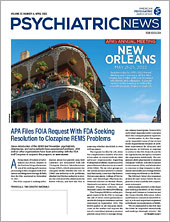Shortly after Hurricane Katrina flooded much of the city of New Orleans, then Sen. Barack Obama noted, “The people of New Orleans weren’t just abandoned during the hurricane. They were abandoned long ago.”
These words echo the increasingly obvious reality that natural disasters do not exist, but rather systems of power disproportionately place vulnerable communities in harm’s way. Four years prior to Katrina, the federal government retracted previous limitations on wetlands development around the city, further eroding New Orleans’ natural defense. Simultaneously, the local Army Corps of Engineers budget for levee management was slashed by 80%. The net result of these decisions and climate change–driven storm intensity was a mass casualty event of more than 2,000 deceased and 1.5 million displaced residents.
In the years following Katrina, studies demonstrated an increased rate of posttraumatic stress disorder among survivors, with increased rates among the Black community. Of those survivors who could not evacuate the city, an estimated one-third had limited access to transportation. While federal relief trickled into the city in the years that followed, forces to reshape New Orleans appeared disinterested in rebuilding for the displaced population, with then Rep. Richard Baker (R) stating, “We finally cleaned up public housing in New Orleans. We couldn’t do it, but God did.” Baker’s recovery plan, which involved forcing residents to either accept buyouts of damaged property versus being solely responsible for repairs, was ultimately dismissed by then President George W. Bush. Despite the rejection of the Baker Plan, the rebuilding of New Orleans remains mired in the vestiges of redlining and gentrification, doing little to empower the most devastated of the communities.
The parallels within the Katrina disaster resonate all too well with mental health professionals in the United States. The weight of history hangs heavy in all aspects of psychiatric care. Housing laws, redlining, the war on drugs, and failure to expand voting rights legislation are a few of the many injustices that have perpetuated race- and class-based stratification affecting our patients daily. The modern medical training institution itself, with its roots in the 1910 Flexner Report, further compounds racial and ethnic inequality among practitioners that reinforces the inaccessibility of care for our patients. Within the field of psychiatry itself, implicit racial bias and racialized concepts such as cultural deprivation theory have previously entrenched subtle forms of racism in the name of race neutrality that to this day require dismantling.
In 2021, Drs. Ruth Shim and Sarah Vinson published Social (In)justice and Mental Health through APA Publishing. A comprehensive and critical examination of mental health inequities and structural racism, the book makes clear the inseparable nature of social justice and the imperative to rise to meet the needs of our patients. Their deconstruction of the presumption of fairness in health care paired with exploration of the healing to be found in collective efficacy of communities are poignant reminders of social forces affecting our patients well beyond the walls of our clinic. Through their pointed narratives, the authors call for the collective introspection as a profession that we so readily ask of our patients. Drs. Shim and Vinson distinguish the therapeutic from moral neutrality.
As we approach APA’s 2022 Annual Meeting, the pairing of the conference’s location with its theme of social determinants of mental health demands reflection on this moment in history. The COVID-19 pandemic and the collective global mobilization around racial justice have only made more apparent the systemic injustice and oppression present in our country. As an organization, we have elected to prioritize social determinants of mental health for our first in-person meeting in a city whose past and present are a testament to the work that has been done and the work we have yet left to do.
As we navigate this year’s meeting, we must acknowledge the complicated social and racial power dynamics embodied by our host city. A retrospective survey in 2015 indicated one-third of those who reported traumatic symptoms in the immediate aftermath of Hurricane Katrina also reported posttraumatic growth 10 years later. As such, New Orleans is not defined by the hurricane, in the same way that our patients are not defined by their own illnesses or traumas. Just as we enlist our patients to be partners in their healing, so too must we enlist ourselves to recognize our complicity in social injustice and the power we have to change it. ■
“Social (In)Justice and Mental Health,” chaired by Vinson, will be held Saturday, May 21, from 10:30 a.m. to noon.
“Trauma in Crescent City: The Intersection of Social Determinants and Racial Injustice in New Orleans,” chaired by Truett, will be held Sunday, May 22, from10:30 a.m. to noon.
